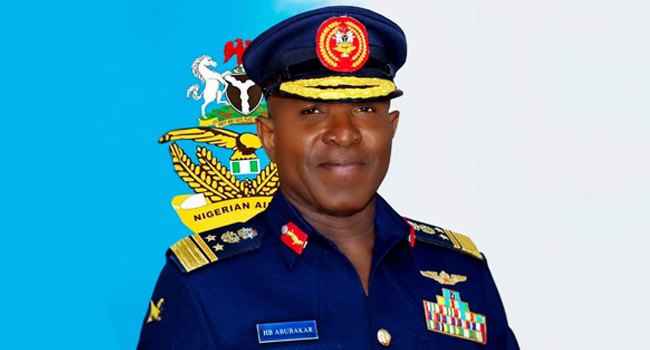The Chief of the Air Staff, Air Marshal Hasan Abubakar, has said cybersecurity, which is a shared responsibility, is key to the Nigerian Air Force’s mission and operation success in the 21st century.
The CAS said the sanctity of data depended on the strength and resilience of the cybersecurity framework.
Air Marshal Abubakar spoke at the Cybersecurity Awareness training organised for NAF personnel on Tuesday.
Abubakar, citing global events, said cyber-attacks could disrupt critical operations and undermine national security.
He said this was particularly concerning for the Nigerian Air Force, as we increasingly rely on cutting-edge technology to enhance its operations.
He said the Nigerian Air Force, being more technologically advanced than other services, cybersecurity was not just an IT concern but “the bedrock of our operational readiness and the key to mission success”.
He said Nigeria as a nation has recognised the importance of cybersecurity through the National Cybersecurity Policy and Strategy, which provides a framework aligned with global best practices for securing Nigeria’s digital environment. The National Cybersecurity Policy mandates the establishment of sectoral Computer Security Incident Response Teams (CSIRTs) and Cyber Security Operations Centers (SOCs) to ensure rapid and effective responses to cyber incidents across key sectors. In line with this policy, the NAF restructured the Communication and Information Systems (CIS) Branch to include a Cybersecurity Operations Cell (COC) within the Directorate of Information Technology (DIT).
Abubakar said the Nigerian Air Force is fully committed to the national vision, and the workshop serves as a vital part of its efforts to ensure that personnel are equipped to meet the demands of securing our collective cyber environment.
He said “The integrity of our nation’s defence systems, the security of our communications, and the sanctity of our data depend on the strength and resilience of our cybersecurity framework.
“For instance, our unmanned aerial vehicles depend on secure digital communications, making them vulnerable to potential hijacking or operational disruptions.
“Similarly, our bespoke Nigerian Air Force Integrated Management System (NAFIMS) and the Digital Correspondence (DIGCO) application, commonly referred to as the ‘Paperless System,’ face risks of data breaches, communication disruptions, and the compromise of sensitive information,”.
He added that the workshop was designed to enhance the Nigerian Air Force’s cyber defence capabilities by equipping participants with advanced knowledge and practical skills.
“From understanding the dynamic nature of cyber threats to adopting best practices for safeguarding sensitive information, this workshop aims to prepare you to be vigilant and proactive. Let me reiterate that cybersecurity is a shared responsibility. Each of us, whether at the command level or within operational units, must adopt a mindset prioritising security at every level. Vigilance, discipline, and strict adherence to protocols are crucial for protecting the integrity of our systems and ensuring mission success”.
Therefore, he urged participants to embrace cybersecurity as a personal responsibility and make it an integral part of their daily operations.
“ Cybersecurity is a continuous journey that demands vigilance, ethical conduct, and a commitment to protecting our nation’s digital infrastructure. Take the knowledge you gain here and apply it with purpose,” he added.
He reaffirmed the Nigerian Air Force’s dedication to protecting Nigeria’s cyber domain.
Earlier, the Chief of Information and Communications Systems, AVM Suleiman, said the Cybersecurity awareness training was not just another training session but an essential part of NAF’s collective mission to secure the integrity of its information networks.
He said, “Cyber threats are more sophisticated than ever, and as the Nigerian Air Force continues to modernize its operations, the need for robust and resilient cybersecurity measures against evolving threats has become ostensible. We are not just guarding the airspace but also protecting data, communications and systems that are integral to the success of every mission,”.



